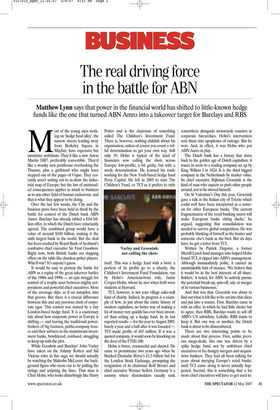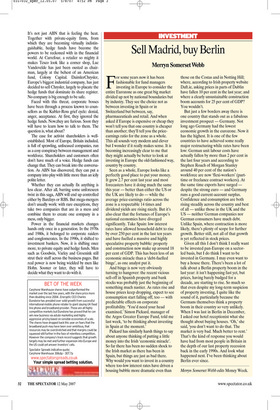BUSINESS
The real driving force in the battle for ABN
Matthew Lynn says that power in the financial world has shifted to little-known hedge funds like the one that turned ABN Amro into a takeover target for Barclays and RBS Most of the young men working on ‘hedge fund alley’, the narrow streets leading away from Berkeley Square in Mayfair, have expensive but unsinister ambitions. They’d like a new Aston Martin DB7, preferably convertible. They’d like a swanky new penthouse overlooking the Thames, plus a girlfriend who might have stepped out of the pages of Vogue. They certainly aren’t setting out to re-draw the industrial map of Europe; but the law of unintended consequences applies as much to business as to any other field of human endeavour, and that is what they appear to be doing.
Over the last few weeks, the City and the business press have been held in thrall by the battle for control of the Dutch bank ABN Amro. Barclays has already tabled a E64 billion offer, to which the Dutch have reluctantly agreed. The combined group would have a value of around $160 billion, making it the sixth largest bank in the world. But the deal has been crashed by Royal Bank of Scotland’s combative chief executive Sir Fred Goodwin. Right now, both British banks are slapping offers on the table like drunken poker players. Who’ll win? It’s anyone’s guess.
It would be easy to portray the battle for ABN as a replay of the great takeover battles of the 1980s and 1990s — an epic struggle for control of a trophy asset between mighty corporations and powerful chief executives. Most of the coverage slips, as if on autopilot, into that groove. But there is a crucial difference between this and any previous clash of corporate egos. This contest was started by a tiny London-based hedge fund. It is a cautionary tale about how corporate power in Europe is shifting — and leaving the traditional powerbrokers of big business, public-company bosses and their advisers in the mainstream investment banks, bewildered, confused, struggling to keep up with the plot.
While Goodwin and Barclays’ John Varley have taken on the Johnny Rotten and Sid Vicious roles in this saga, we should actually be watching the Malcolm McLaren: the background figure who turns out to be pulling the strings and scripting the lines. That man is Chris Hohn, who looks disturbingly like Harry Potter and is the chairman of something called The Children’s Investment Fund. There is, however, nothing childish about his organisation, unless of course you count a wilful determination to get your own way. Still only 39, Hohn is typical of the kind of financiers now calling the shots across Europe: low-profile, a bit geeky, but with a steely determination. He learned his trade working for the New York-based hedge fund Perry Capital. He left in 2003 to start The Children’s Fund, or TCI as it prefers to style itself. This was a hedge fund with a twist: a portion of its profits go to a charity, the Children’s Investment Fund Foundation, run by Hohn’s American-born wife, Jamie Cooper-Hohn, whom he met when both were students at Harvard.
TCI, however, is not your village cake-stall kind of charity. Indeed, its progress is a example of how, in just about the entire history of modern capitalism, no better way of making a lot of money very quickly has ever been invented than setting up a hedge fund. In its last reported results — for the year to August 2005, barely a year and a half after it was founded TCI made profits of £65 million. If it was a quoted company, it would soon be knocking on the door of the FTSE-100.
Hohn is brave, resourceful and shrewd. He came to prominence two years ago when he blocked Deutsche Börse’s £1.3 billion bid for the London Stock Exchange, prompting the resignation of its chairman Rolf Breuer and chief executive Werner Seifert. Germany is a country where shareholders usually rank somewhere alongside motorcycle couriers in corporate hierarchies. Hohn’s intervention sent them into apoplexies of outrage. But he won. And, in effect, it was Hohn who put ABN Amro in play.
The Dutch bank has a history that dates back to the golden age of Dutch capitalism: it traces its roots to a trading company set up by King Willem I in 1824. It is the third biggest company in the Netherlands by market value. Its chief executive Rijkman Groenink is the kind of man who expects to push other people around, not to be shoved himself.
On St Valentine’s Day this year, Groenink gave a talk in the Italian city of Trieste which could well have been interpreted as a comeon for other European banks. ‘The current fragmentation of the retail banking sector will make European banks sitting ducks,’ he argued, suggesting that consolidation was needed to survive global competition. He was probably thinking of himself as the hunter and someone else’s bank as the bird. But six days later, he got a letter from TCI.
Written by Patrick Degorce, a former Merrill Lynch fund manager who helped Hohn found TCI, it ripped into ABN’s management. Although immaculately polite, it carried an unmistakable hint of menace. ‘We believe that it would be in the best interests of all shareholders,’ it noted, for ABN ‘to actively pursue the potential break-up, spin-off, sale or merger of its various businesses.’ And that was that. Groenink was about to find out what it felt like to be cut into thin slices and put into a toaster. First, Barclays came in with an offer, to which he had little choice but to agree, then RBS. Barclays wants to sell off ABN’s US subsidiary, LaSalle; RBS wants to keep it. But one way or another, the Dutch bank is about to be dismembered.
There are two interesting points to be made about that process. First, unlike previous mega-deals, this one was driven by a spiky hedge fund, not by ambitious chief executives or fee-hungry mergers and acquisitions bankers. They had all been talking for years about merging Europe’s retail banks: until TCI came along it never actually happened. Second, this is something that a lot more chief executives will have to get used to. It’s not just ABN that is feeling the heat. Together with private-equity firms, from which they are becoming virtually indistinguishable, hedge funds have become the powers to be reckoned with in the financial world. At Carrefour, a retailer so mighty it makes Tesco look like a corner shop, Luc Vandevelde has just been ousted as chairman, largely at the behest of an American fund, Colony Capital. DaimlerChrysler, Europe’s biggest industrial company, has just decided to sell Chrysler, largely to placate the hedge funds that dominate its share register. No company is big enough to be safe.
Faced with this threat, corporate bosses have been through a process known to counsellors as the Kubler-Ross grief cycle: denial, anger, acceptance. At first, they ignored the hedge funds. Now,they are furious. Soon they will have to learn how to talk to them. The question is, what about?
The case for activist shareholders is wellestablished. Most of Europe, Britain included, is full of sprawling, unfocused companies, run as a cosy conspiracy between management and workforce. Shareholders and customers often don’t have much of a voice. Hedge funds can change that. They can break into the conversation. As ABN has discovered, they can put a company into play with little more than an icily polite letter.
Whether they can actually fix anything is less clear. After all, barring some unforeseen twist in this saga, ABN will end up controlled either by Barclays or RBS. But mega-mergers don’t usually work: with rare exceptions, they take two companies that are in a mess and combine them to create one company in a mess, only bigger.
Power in the financial markets changes hands only once in a generation. In the 1970s and 1980s, it belonged to corporate raiders and conglomerates. In the 1990s, it shifted to investment bankers. Now, it is shifting once more, to private equity and hedge funds. Men such as Goodwin, Varley and Groenink still strut their stuff across the business pages. But real power is now being wielded by men like Hohn. Sooner or later, they will have to decide what they want to do with it.











































































 Previous page
Previous page